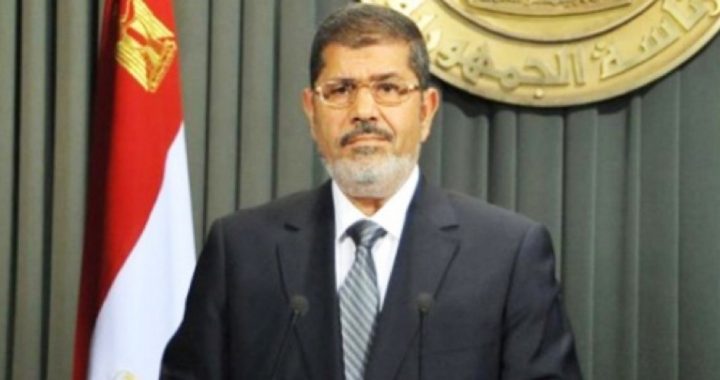
Since the onset of the events in December 2010 which led to the “Arab Spring” in Egypt, the Islamist agenda of the Muslim Brotherhood has been touted by that organization, and duly noted by foreign observers who were concerned for the post-Mubarak future of that nation. As noted by The New American in April 2011, the rise to power of the Muslim Brotherhood and similar Islamist groups in Egypt signaled a worsening relationship between Egypt and its Israeli neighbors, and between the government and Egypt’s Christian minority population. And recently translated interviews demonstrate that Egypt’s president, Mohammed Morsi, (pictured) had little interest in seeing his party continue the relationship that has existed between Israel and Egypt since the 1978 Camp David Accords because, in his assessment, Israel’s “Zionist” residents are “the descendants of apes and pigs.”
On January 4, the Jerusalem Post published Morsi’s comments, which date to several months before the uprising that led to the overthrow of former-Egyptian President Mubarak’s government:
Israeli-Palestinian negotiations are “a waste of time and opportunities” as Arabs and Muslims get nothing out of engagement with “the descendants of apes and pigs,” current Egyptian President Mohamed Morsi asserted in September 2010, according to newly translated interviews published this week by the Middle East Media Research Institute (MEMRI).
In the first interview, aired on Lebanon’s Al-Quds TV on September 23, 2010, Morsi denounced the Palestinian Authority as a creation of “the Zionist and American enemies for the sole purpose of opposing the will of the Palestinian people.” Therefore, he stressed, “No reasonable person can expect any progress on this track.”
“Either [you accept] the Zionists and everything they want, or else it is war,” Morsi said, “This is what these occupiers of the land of Palestine know — these blood-suckers, who attack the Palestinians, these warmongers, the descendants of apes and pigs.”
The article for the Post made it clear that Morsi’s anti-Semitic rant was far from an isolated incident:
In a separate interview translated by MEMRI, aired on the same network on March 20, 2010, Morsi affirmed that “The Zionists have no right to the land of Palestine…. What they took before 1947-8 constitutes plundering, and what they are doing now is a continuation of this plundering. By no means do we recognize their Green Line. The land of Palestine belongs to the Palestinians, not to the Zionists.”
He therefore called on the Islamic world “to confront this Zionist entity” and to severe “all ties of all kinds … with this plundering criminal entity,” including a total boycott of Israel and the avoidance of “normalization of relations with it.”
Morsi concluded that the Arab-Islamic world “want[s] a country for the Palestinians on the entire land of Palestine … [and] all the talk about a two-state solution and about peace is nothing but an illusion.”
The Jews, he said, “have been fanning the flames of civil strife wherever they were throughout history. They are hostile by nature…. The Zionists understood nothing but the language of force.”
As a citizen, Morsi’s viewpoints were his own; what remains to be seen is the extent to which the vehement positions of a member of a once-banned Islamist organization will translate into the foreign policy of the president of Egypt. When Morsi won the race for the presidency last June, the implications of the Muslim Brotherhood’s anti-Israeli rhetoric were being weighed, as was noted by The New American on June 25:
In February 2011, a leader of the Muslim Brotherhood, Muhammad Ghannem, reportedly called for the closing of the Suez Canal and declared that the people of Egypt “should be prepared for war against Israel.” Now that the Brotherhood has taken control of the presidency, a more modest approach toward Israel is being advocated. Morsi’s [acceptance] speech seemed to offer a degree of assurance that he would not immediately nullify the peace treaty that has existed between Egypt and Israel since the treaty was signed between the two nations in 1979.
According to the AP report, “Speaking on Egyptian television Sunday evening, Morsi declared he had a ‘message of peace. We will respect all international agreements.’ He did not mention Israel but the remark seemed to be a reassuring nod to respecting the peace treaty.” The nebulous message of peace was greeted with similarly cautious remarks from Tel Aviv: “The reaction from Israel was subdued, with Prime Minister Benjamin Netanyahu saying he respected the results of Egypt’s democratic process and hoped the peace agreement between the two countries would remain intact. Ecstatic residents in the Hamas-ruled Gaza Strip filled the streets, fired guns in the air and handed out candy.”
Thus far, the newly translated comments by President Morsi have drawn little attention in the U.S. media. It is hard to imagine that if any Western politician had made comments that were even remotely similar regarding either Jews or Muslims that such a politician could survive. But in the strange universe in which extremist Muslim rhetoric is simply wished away, only time will tell which Morsi is the “real Morsi”: the one with the “message of peace,” or the man who calls other men the descendants of apes and pigs.



